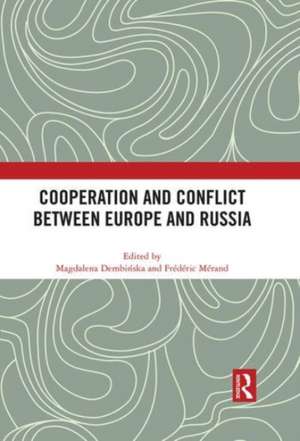Cooperation and Conflict between Europe and Russia
Editat de Magdalena Dembińska, Frederic Méranden Limba Engleză Paperback – 25 sep 2023
Despite a deterioration of geostrategic relations between Europe and Russia since the end of the Soviet Union, Cooperation and Conflict between Europe and Russia explores the intriguing coexistence of conflict and cooperation at the local level and across sectors and institutions.
The chapters in this book were originally published as a special issue of the journal East European Politics.
Preț: 259.98 lei
Preț vechi: 326.49 lei
-20% Nou
Puncte Express: 390
Preț estimativ în valută:
49.75€ • 53.20$ • 41.48£
49.75€ • 53.20$ • 41.48£
Carte tipărită la comandă
Livrare economică 17 aprilie-01 mai
Preluare comenzi: 021 569.72.76
Specificații
ISBN-13: 9781032064406
ISBN-10: 1032064404
Pagini: 134
Dimensiuni: 174 x 246 mm
Greutate: 0.45 kg
Ediția:1
Editura: Taylor & Francis
Colecția Routledge
Locul publicării:Oxford, United Kingdom
ISBN-10: 1032064404
Pagini: 134
Dimensiuni: 174 x 246 mm
Greutate: 0.45 kg
Ediția:1
Editura: Taylor & Francis
Colecția Routledge
Locul publicării:Oxford, United Kingdom
Public țintă
Postgraduate and UndergraduateCuprins
1. Theorising cooperation and conflict in Euro-Russian relations
Frédéric Mérand, Magdalena Dembińska and Dominika Kunertova
2. Conflict and cooperation between Europe and Russia: the autonomy of the local
Magdalena Dembińska, Frédéric Mérand and Anastasiya Shtaltovna
3. Hybrid geopolitics in EU-Russia relations: understanding the persistence of conflict and cooperation
Cristian Nitoiu and Florin Pasatoiu
4. Kaliningrad: a dual shift in cooperation and conflict
Anna-Sophie Maass
5. Not on speaking terms, but business as usual: the ambiguous coexistence of conflict and cooperation in EU–Russia relations
Tom Casier
6. Theorising conflict and cooperation in EU-Russia energy relations: ideas, identities and material factors in the Nord Stream 2 debate
Marco Siddi
7. Crisis response, path dependence, and the joint decision trap: the EU’s eastern and Russia policies after the Ukraine crisis
Joan DeBardeleben
Frédéric Mérand, Magdalena Dembińska and Dominika Kunertova
2. Conflict and cooperation between Europe and Russia: the autonomy of the local
Magdalena Dembińska, Frédéric Mérand and Anastasiya Shtaltovna
3. Hybrid geopolitics in EU-Russia relations: understanding the persistence of conflict and cooperation
Cristian Nitoiu and Florin Pasatoiu
4. Kaliningrad: a dual shift in cooperation and conflict
Anna-Sophie Maass
5. Not on speaking terms, but business as usual: the ambiguous coexistence of conflict and cooperation in EU–Russia relations
Tom Casier
6. Theorising conflict and cooperation in EU-Russia energy relations: ideas, identities and material factors in the Nord Stream 2 debate
Marco Siddi
7. Crisis response, path dependence, and the joint decision trap: the EU’s eastern and Russia policies after the Ukraine crisis
Joan DeBardeleben
Notă biografică
Magdalena Dembińska is Professor of Political Science and Academic Director of CÉRIUM, the Centre for International Studies at Université de Montréal.
Frédéric Mérand is Professor of Political Science and Scientific Director of CÉRIUM, the Centre for International Studies at Université de Montréal.
Frédéric Mérand is Professor of Political Science and Scientific Director of CÉRIUM, the Centre for International Studies at Université de Montréal.
Descriere
Tracking the evolution of conflict and cooperation patterns in three zones of contact between 1991 and 2016, this edited volume argues that, although the standard narrative remains compelling, local patterns of cooperation and conflict are partly autonomous from the geostrategic level.
